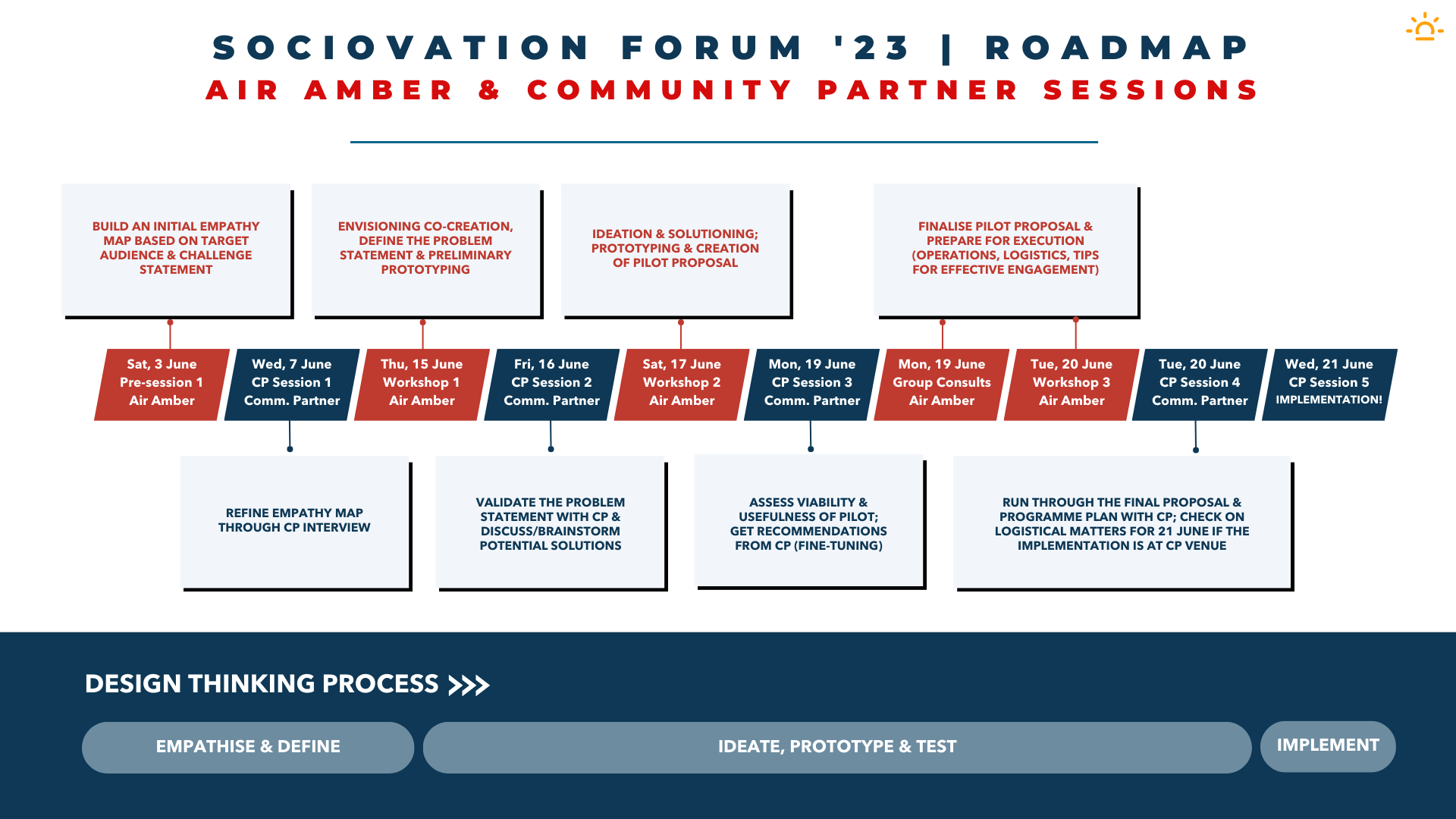Sociovation 2023 Alumni Mentors - Facilitation Resources
Welcome Alumni Mentors! Please find the additional resources that we have prepared for you below. We hope that you will find it useful throughout the programme. Wishing you nothing but the best!
Your Role as an Alumni Mentor
Roadmap of Sociovation Forum 2023
Engagement Ideas (8 June Zoom Session)
Tips for Group Discussions & Sharing
Tips in Facilitation
YOUR ROLE AS AN ALUMNI MENTOR!
As a Co-Facilitator during the Air Amber (AA) Workshops & Community Partner (CP) sessions, you will need to guide your assigned group to achieve its end goal: Implementation! Along the way, your group may face a multitude of issues and we need your help to assist them in overcoming those challenges.
Key Responsibilities
Keep your Group on track in discussions and activities. Leverage on strengths.
Assist your Group by volunteering to manage time in and out of the workshops/sessions.
Remind your Group of important tasks (e.g. activities on Miro, questions for CPs, etc.)
Motivate your Group and lend your experience by sharing stories/anecdotes to avoid being prescriptive.
HAVE FUN, BUILD RAPPORT, AND MAKE NEW FRIENDS WITH YOUR GROUP!! :)
THE JOURNEY!
ENGAGEMENT IDEAS!
PRE-ENGAGEMENT: CREATING A GREAT FIRST IMPRESSION
Ensure participants feel welcome by being proactive in approaching and engaging them.
Establish a Safe Space within your group by determining ground rules for respectful communication.
Show care and concern by familiarising with each others’ names (or nicknames) and check in on your groupmates’ emotional needs/state.
ENGAGEMENT: CREATING A GREAT LAST IMPRESSION
Provide ample opportunities for EVERYONE to contribute their ideas, opinions, etc.
Find the right moments to inject yourself into discussions and avoid dominating the conversation.
Have your personal bag of Tips, Tricks & Tools to help your group overcome challenges or issues they may experience.
POST-ENGAGEMENT: CREATING A GREAT LASTING IMPRESSION
Add elements of fun throughout the programme to build a memorable experience (e.g. humour, games, capturing photos/videos, etc.)
Create a unique ritual or practice together with your group mates to build rapport and camaraderie (e.g. nightly skincare routine, team cheer/handshake, etc.)
Identify moments and/or touchpoints during the programme to provide words of affirmation and encouragement to your group.
TIPS FOR GROUP DISCUSSIONS!
The purpose of the group discussion and sharing is to allow participants to be fully involved in the topic covered. It is based on the assumption that we learn from one another’s knowledge and experiences.
A common technique to allow all participants to share would be to form smaller groups and provide clear instructions on the next steps.
Another technique to conduct group discussions is to assign roles. Several roles include a leader to co-facilitate the discussion, a scribe to record the points raised by participants, and a presenter to share insights with the other groups. Try appointing different people for each role to maximise participation.
Ensure that you prepare all materials that you might need. For example, you should prepare writing materials (e.g. pens, paper) for note-taking. Stay vigilant and observe any needs that might surface within the group.
As a facilitator, your primary role is to direct the discussion by asking other participants to comment on points raised in the sharing. This will allow others to participate and share their thoughts.
As a facilitator, you should be positive:
By acknowledging and affirming the points raised by participants
By encouraging dialogue among participants
By paraphrasing to show you understand or to clarify their points
By using their points and leading them to other learning points or revelations
By helping them understand and visualize success (sharing your own experiences!)
If you disagree with the points raised, a facilitator may use several techniques:
By asking others for their comments on the point being made
By asking them to elaborate or asking why they think that way
By gently correcting the person and explaining why calmly
By not being defensive when providing your points of view
TIPS IN FACILITATION!
Prepare by focusing on the outcome.
Speak less than participants: don’t do what the group member can do for themselves.
Listen actively to participants. Avoid or remove distractions (e.g. mobile device).
Manage the agenda/objective and time well.
Make people feel comfortable so that they may share openly.
Remember that wisdom is in the village and do not prescribe all the answers.
Acknowledge and affirm contributions from participants.
Respect participants by ensuring one person speaks at a time.
Focus on being constructive.
Diffuse strong emotions and tense moments.
Challenges views, not individuals.
Use humour and positive nonverbal gestures appropriately.
Differences are respected and utilised.
Defer important non-agenda items for future discussion.
Summarise key issues and perspectives.
Avoid ‘scapegoating’ and triangulation, which might make participants feel unwelcome/uncomfortable.

